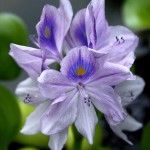Water Hyacinth Projects
 An Environmental and Social Crisis with an Abundant Source Solution
An Environmental and Social Crisis with an Abundant Source Solution
The Mission
The Water Hyacinth Sanitary Pad Project is a sustainable social enterprise that produces sanitary pads out of water hyacinth, an invasive aquatic species becoming a worldwide scourge.
The production of a locally made pad from water hyacinth provides girls and women a low cost, biodegradable product that sustains income-generating jobs and provides school girls with access to necessary personal hygiene products.
The Need
Societal:
Girls without access to sanitary hygiene products can miss up to 50 days of school per year causing them to fall behind in class and be ill-prepared for national exams. Therefore, they are rarely eligible for scholarships and are often unable to attend secondary schools.
Access to education can significantly change the course of a girl’s life. It is estimated that when a girl receives seven or more years of education, she marries four years later and has 2.2 fewer children, giving her the opportunity to reach her full potential. Additional schooling also provides life-saving public health education, such as HIV/AIDS prevention.
Most young women lack privacy to be able to wash and dry reusable cloth pads. Without access to clean water, dangerous bacteria can grow on cloth pads and menstrual cups. Imported pads are plastic, difficult to dispose of and expensive.
Public Health & Environmental Implications:
Water hyacinth is one of the fastest growing, invasive plants on the planet. This non-native species grows rapidly causing obstruction of water-based transportation while limiting access to fishing and valuable community water sources. Water hyacinth also provides optimal breeding conditions for vectors that spread illnesses such as malaria, encephalitis, bilharzias, gastro intestinal disorders, and schistosomiasis.
The proliferation of water hyacinth threatens biodiversity and destroys native plants, fish and other species by depleting natural nutrients and deoxygenating the water. Water hyacinth speeds water evaporation, therefore, shrinking sources of fresh water at an incredibly rapid rate. It is estimated that the flow of the Nile has been reduced by 10% as a result of the water hyacinth in Lake Victoria.
The Approach
The production of a locally manufactured pad made from water hyacinth: provides a low cost, biodegradable product for girls and women; sustains income-generating jobs for a low employment opportunity community; provides school girls living in poverty with access to necessary personal hygiene products; and reduces water hyacinth’s detrimental impact on communities.
Product Award
Village Volunteers’ partner, Scandinavian Industrial Design Engineer Group (SIDEG), pioneered the JaniPad and won a product award from Victor Papanek’s Design for the Real World REDUX.
Water Hyacinth Briquetting Project
In addition to the sanitary pad project, the unusable parts of water hyacinth have the added usefulness of being biomass for fuel briquettes with the use of simple manual equipment. Water hyacinth briquettes take the place of local trees which have been traditionally cut and used as a source of fuel. The rapid decline of flora in the region presents an immediate ecological and environmental need to reverse deforestation and replace the use of trees as fuel with a more sustainable alternative. (See Moringa Tree Project .)
How You Can Help
- Donate towards the development of the sanitary pad project .
- Join Village Volunteers to work with women’s groups and school girls or help construct buildings and simple equipment.
- Keep updated on our progress on Facebook.
- Assist us with fundraising events or get your workplace involved through a matching program. Contact us .
